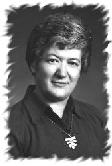

 Vol. 3, No. 3, July, 1998
Why don't Catholics Evangelize?
Vol. 3, No. 3, July, 1998
Why don't Catholics Evangelize?by Sr. Angeline Bukowiecki, S.N.C.
 Pope Paul VI raised three burning questions in the introduction to his Apostolic Exhortation, "Evangelization in the Modern World": "In our day, what has heppened to that hidden energy of the Good News, which is able to have a powerful effect on man's conscience? To what extent and in what way is that evangelical force capable of really transforming the people of this century? What methods should be followed in order that the power of the Gospel may have its effect? . . . these inquiries make explicit the fundamental question that the Church is asking herself today . . . does the Church or does she not, find herself better equipped to proclaim the Gospel and to put it into people's hearts with conviction, freedom of spirit and effectiveness?" (EN 4).
The heart of why most Catholic Christians are afraid to carry out their fundamental mission to evangelize is that they have no idea of how to make a clear, succinct, yet easy to understand, presentation of the Good News of the Gospel.
One reason and perhaps the main reason why our people have no idea of how to present the Gospel is that as the Gospel began to be preached by the apostles, questions were raised about how Jesus could be God when Yahweh alone is God. How can this be? There is only one God!
And many other such questions were raised. The Church in trying to state clearly what she believed had to turn to philosophy for the language?structure in which to do that. As a result, over the centuries, the Gospel became identified with various systems of thought involving philosophies and theologies. For example, the philosophical and theological discussions of the Church concerning the meaning of the Father, Son, and the Holy Spirit that led our understanding of the Trinity. This was the result of faith seeking understanding. Faith gives the answer to our questions; theology, the study of God, ask, "How can this be?" Philosophy gives us the language structure in which theology can answer these questions.
Identifying such concepts with the Gospel, as beautiful as they may be, requires that a person wishing to evangelize, to proclaim the Gospel to others, would have to be a trained teacher of philosophy to even begin to understand the message of Christianity.
What the New Testament shows us is that this is not the case because the apostles were uneducated men. With the experience of Pentecost, all that Jesus had said and done, the apostles now understood in a way they had not before. And it was about this Jesus-experience that the apostles began to preach. What the apostles wanted was for everyone to share their experience and to know how much God loves all men and women.
With the experience of Pentecost, the outpouring of the Holy Spirit, the apostles were transformed from being scared, timid men, as seen in the Garden of Gethsemane, who deserted Jesus, into bold, courageous men. With the experience of the outpouring of the Holy Spirit upon them, Peter stands up before the crowd who had gathered outside the upper room and preaches about Jesus with boldness and courage.
Evangelization is, first and foremost, the proclamation of the Good News that the evangelizer has personally experienced. And it is about this Jesus?experience that the evangelizer preaches and wants everyone to experience as well. This is what the world needs now.
Pope Paul VI raised three burning questions in the introduction to his Apostolic Exhortation, "Evangelization in the Modern World": "In our day, what has heppened to that hidden energy of the Good News, which is able to have a powerful effect on man's conscience? To what extent and in what way is that evangelical force capable of really transforming the people of this century? What methods should be followed in order that the power of the Gospel may have its effect? . . . these inquiries make explicit the fundamental question that the Church is asking herself today . . . does the Church or does she not, find herself better equipped to proclaim the Gospel and to put it into people's hearts with conviction, freedom of spirit and effectiveness?" (EN 4).
The heart of why most Catholic Christians are afraid to carry out their fundamental mission to evangelize is that they have no idea of how to make a clear, succinct, yet easy to understand, presentation of the Good News of the Gospel.
One reason and perhaps the main reason why our people have no idea of how to present the Gospel is that as the Gospel began to be preached by the apostles, questions were raised about how Jesus could be God when Yahweh alone is God. How can this be? There is only one God!
And many other such questions were raised. The Church in trying to state clearly what she believed had to turn to philosophy for the language?structure in which to do that. As a result, over the centuries, the Gospel became identified with various systems of thought involving philosophies and theologies. For example, the philosophical and theological discussions of the Church concerning the meaning of the Father, Son, and the Holy Spirit that led our understanding of the Trinity. This was the result of faith seeking understanding. Faith gives the answer to our questions; theology, the study of God, ask, "How can this be?" Philosophy gives us the language structure in which theology can answer these questions.
Identifying such concepts with the Gospel, as beautiful as they may be, requires that a person wishing to evangelize, to proclaim the Gospel to others, would have to be a trained teacher of philosophy to even begin to understand the message of Christianity.
What the New Testament shows us is that this is not the case because the apostles were uneducated men. With the experience of Pentecost, all that Jesus had said and done, the apostles now understood in a way they had not before. And it was about this Jesus-experience that the apostles began to preach. What the apostles wanted was for everyone to share their experience and to know how much God loves all men and women.
With the experience of Pentecost, the outpouring of the Holy Spirit, the apostles were transformed from being scared, timid men, as seen in the Garden of Gethsemane, who deserted Jesus, into bold, courageous men. With the experience of the outpouring of the Holy Spirit upon them, Peter stands up before the crowd who had gathered outside the upper room and preaches about Jesus with boldness and courage.
Evangelization is, first and foremost, the proclamation of the Good News that the evangelizer has personally experienced. And it is about this Jesus?experience that the evangelizer preaches and wants everyone to experience as well. This is what the world needs now.